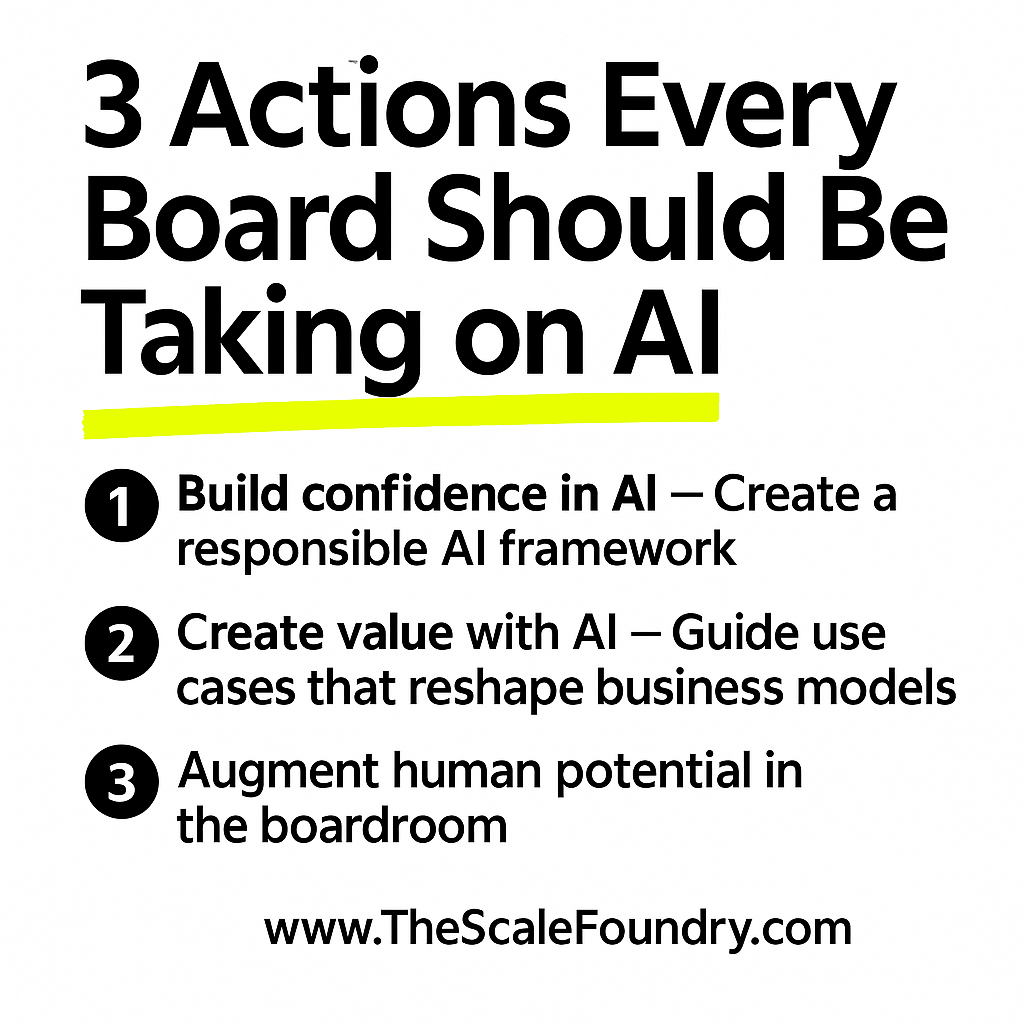Board Strategy
3 Actions Every Board Should Be Taking on AI (Before It’s Too Late)
AI isn’t just a tech issue — it’s a boardroom imperative. From ethics to execution, today’s directors must guide AI adoption with speed, oversight, and strategic clarity. Here’s where to start.
Artificial intelligence is no longer a “future trend” — it’s a present-day boardroom agenda item.
Yet many boards are still stuck in passive observation mode, unsure how to move from theory to action.
EY’s Board Reimagined series offers a powerful call to action: Boards must govern AI, not just react to it.
At The Scale Foundry, we’ve seen firsthand how AI is reshaping healthcare, life sciences, and deep tech startups — and how unprepared many boards are to guide these transformations.
If you sit on a board — or plan to — here are the 3 core responsibilities you must take seriously.
1. Build Confidence in AI: Make Governance Real
Boards can’t govern what they don’t understand. That’s why the first step isn’t launching AI projects — it’s building a clear, responsible governance framework.
What this looks like in practice:
• Align AI with your existing enterprise risk management systems
• Implement policies for transparency, bias mitigation, explainability, and data security
• Ask: Who is responsible for AI oversight? Do we have a committee? A task force? A quarterly AI impact report?
Red flag: Many companies let AI “happen” in silos. Boards need to demand integration — not just experimentation.
2. Create Value with AI: Go Beyond Automation
Too many AI efforts focus only on back-office efficiencies. Smart boards push further — asking how AI can reshape business models, unlock new markets, or enable entirely new revenue streams.
Key questions to ask as a director:
• Which parts of our business could be AI-native in 5 years?
• Are we investing in capabilities, not just tools?
• Do we have the right metrics to track AI value (e.g. time-to-insight, automation ROI, data flywheel strength)?
Boards must lead the charge in connecting AI to enterprise value — not just cost-cutting.
3. Augment Human Potential in the Boardroom
This doesn’t just mean bringing in tech experts. It means elevating your board’s collective intelligence:
• Upskill current directors on AI basics (e.g., LLMs, predictive analytics, model drift)
• Add independent directors with technical fluency and digital transformation expertise
• Embed AI tools into board decision-making (yes — AI can help boards simulate scenarios and analyze risk in real time)
And importantly: boards must ensure diverse voices shape AI strategy — across gender, discipline, and lived experience.
The best boards ask:
Who isn’t in the room?
What biases are we reinforcing?
Are we amplifying human judgment — or automating it away?
Bonus: 3 Additional Red Flags to Watch For
As a director or founder working with a board, you should be alert to these common pitfalls:
1. AI hype cycles with no strategic tie-back
(i.e., launching pilots without defining success)
2. Shadow AI projects in business units that avoid security or compliance reviews
3. No crisis response plan for AI-generated errors, misuse, or reputational damage
AI governance isn’t just about seizing opportunity — it’s about managing non-obvious risk.
Final Thought: AI Isn’t a Tech Problem — It’s a Leadership Imperative
If your board isn’t talking about AI, you’re already behind.
And if they are talking about it — but still stuck in theory — it’s time to shift gears.
AI is reshaping decision-making, value creation, and risk in every industry.
Boards that lead the conversation will shape the future.
Boards that wait will be left reacting to it.
Ready to Get Board Ready — and AI Ready?
At The Scale Foundry, our Board Ready Masterclass equips rising and current board leaders to:
• Navigate AI governance confidently
• Increase strategic value in the boardroom
• Land their first (or next) board seat with clarity
Whether you’re prepping for your first role or helping steer a scale-up through transformation, this is the toolkit and strategy you need.
